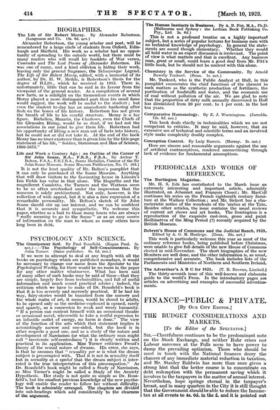PSYCHOLOGY AND SCIENCE.
The Omnipotent Self. By Paul Bousfield. (Regan Paul. 58. net. )—The Psychology of Self-Consciousness. By Julia Turner. (Same publisher. 6s. 6d. net.)
If we were to attempt to deal at any length with all the books on psychology which are published nowadays, it would be necessary to change our name from the Spectator to the Psychological Weekly, for there would be no room in the paper for any other matter whatsoever. What has been said of many other of such books may be said of these—that they are simple, largely free from technicalities, and full of useful information and much sound practical advice ; indeed, the criticism which we have to make of Dr. Bousfield's book is that it is too severely and narrowly practical. If he had his way, fairy-stories would be banished from the nursery and the whole realm of art, it seems, would be closed to adults, to be opened only as the medicine-cupboard is opened, rarely and sparely, as a concession to weak and weary humanity. "If a person can content himself with an occasional theatre or occasional novel, wherewith to take a restful regression to an infantile outlet of energy, no harm is done." The view of the function of the arts which that statement implies is astonishingly narrow and one-sided, but the book is in other respects a good one, and as a study of the nature and development of Narcissism (or what the ordinary man might call "inveterate self-centredness ") it is clearly written and practical in its application. Miss Turner criticizes Freud's theory of the sexual nature of dreams. His error, she says, is that he assumes that "sexuality per se is what the dream subject is preoccupied with. That it is not in sexuality itself but in sexuality as a symbol that the dream subject is inter- ested is the true interpretation of this preoccupation." As Dr. Bousfield's book might be called a Study of Narcissism, so Miss Turner's might be called a Study of the Anxiety Hypothesis. Her study is not quite so simple as Dr. Bous- field's, but the smallest previous knowledge of the new psycho- logy will enable the reader to follow her without difficulty. The book is admirably arranged. The chapters are divided into sub-headings which add considerably to the clearness of the argument.










































 Previous page
Previous page